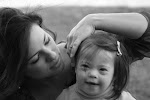We've seen a lot of growth in Bridget over the last couple of months. A break in services--and a break from the general routine of the school year--has been valuable in many ways for us.
If you've been reading here, you've seen some of my thoughts on acceptance of circumstance; appreciating gifts--what each person brings to the table, and all the layers in people and in our lives; seeing potential in all people; and encouraging new attitudes toward "disability". I am coming to some conclusions about things I've been thinking about since Bridget was born and am finally able to put some of these ideas and theories into words.
I posted about disability being a natural--and valuable--part of life just after I began reading Disability is Natural by Kathie Snow. (Read the post here.) The book brought up many things I'd already been mulling over in my own mind. Particularly because we've been through so much evaluation to complete the transition process, I've been wondering how "the system" sees Bridget, and how that has (and will continue to have) an impact on the way she's perceived (and therefore what opportunities she's offered, how she is treated, etc.).
I've realized that, in many ways, limits have been set for Bridget long before she's had a chance to say anything about it.
Without question, there are some exceptions to the notion that doctors and therapists buy into prognoses and labels that go along with a diagnosis. There are people in the medical field and the social service system who not only believe in helping kids to meet their full potential, but also believe that a child's potential is determined by the individual child and not the diagnosis.
Many of our kids have been helped greatly by doctors and/or therapists. Unfortunately, we've all also seen the pitfalls of buying into the "medical model" or the "service system mentality" and the limits that each sets on our children, sometimes inadvertently. It is strange how things that are meant to help end up having great potential to also harm.
As a parent of a child with a disability, it is important to frame your own perspective on what your child's diagnosis means to you, and to be aware of the implications of your own thoughts and actions in planning and managing your child's care.
Disability is Natural should be required reading for parents with a new diagnosis (Kathie Snow has a great website, too). I plan to cover bits and pieces of the book in my next several posts, so stay tuned if you're interested in this topic. Something I found particularly interesting follows:
The Death of Dreams
Initially, all parents have dreams for their children. We have pictures in our heads of what a child will look like, what type of family we'll have, and so forth. Fathers dream of playing ball with a son or protecting their little princess from high school Romeos. Mothers dream of sweet kisses and hugs, and fulfilling the girlhood dream of being a mother. Many parents dream big, long dreams about their children: college graduation, a wedding twenty years down the road, and grandchildren. In the time it takes the doctor to tell us our child's diagnosis, however, those dreams evaporate before our eyes. Our world is shaken to the core. Some of us become numb, some of us try to be brave, and some of us become angry. The hope, the dreams, and the bright future we pictured for our child is gone, replaced by a very scary unknown world.
In describing the prognosis, the physician gives parents many different bits of information, depending on the disability. But almost all predictions have one thing in common: we're told far more about what our children will not accomplish, than what they will. We're given the "bad" news: our children's perceived deficits far exceed their abilities....
Before any of our precious children have had an opportunity to define themselves, they've been defined by their disability labels. There is no greater loss.
And later in the same chapter:
From Dark Grief to Bright Reality
The medical model is the genesis of parental grief. Diagnoses, prognoses and labels attached to our children plunge us into a dark world. Then the promise of services and treatments temporarily lifts us from the darkness. But when we reject the medical model and the negative stereotypes presented by doctors and accepted by society, we can anchor ourselves to the reality that our children have bright futures and unlimited potential...And this belief has a greater influence over your child's success than any disability label. This is so important...Your belief in your child and his potential has a greater influence over his success than his disability.
Your turn: Please share about one or more of the following topics. Were you given a positive or negative view of your child's prognosis at the time of diagnosis? What conclusions have you reached about the role of doctors and therapists in your child's life? What experiences have you had with either medical professionals or therapists and teachers that have made you think that others are working (1) for your child or (2) inadvertently holding him/her back? What lessons have you learned--how have you pushed aside negative stereotypes and come to see the potential in your child?
Next up: "disability" and the service system











Enjoyed this thought provoking post and you have inspired me to blog about this very topic... when I can find time... as I have had a very recent experience that is quite relevant. Thanks for the inspiration!
ReplyDeleteLisa, I am just getting started on this book. I've heard really wonderful things about it. I can't get my thoughts together well enough at the moment to answer your very thoughful questions, but I imagine I will be blogging about these things in the future. Thank you for sharing your thoughts.
ReplyDelete